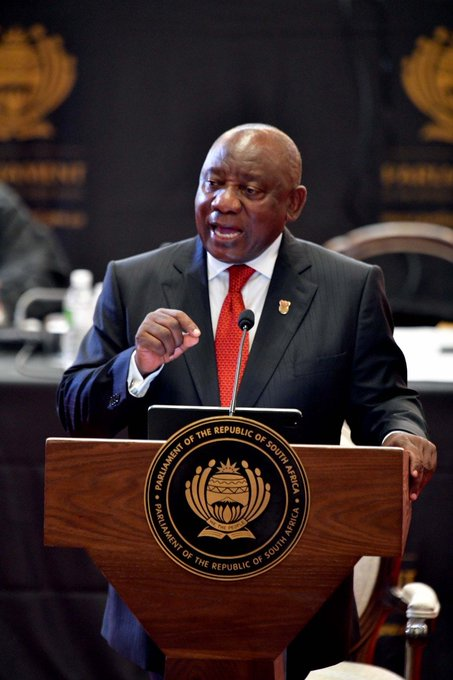President Cyril Ramaphosa State of the Nation Address 2022 – Photo Twitter/@GovernmentZA
Cape Town – It was no ordinary sitting of Parliament. For the first time in South African history, President Cyril Ramaphosa delivered the State of the Nation Address (SONA) at a venue other than the National Assembly Chamber – it was at the Cape Town City Hall. Ramaphosa presented a range of “reforms” and presented feedback on the outcome of some of the promises made last year.
In the opening remarks of his sixth SONA, Ramaphosa set the tone by describing the fire that engulfed Parliament last month as being “symbolic of the devastation caused by the COVID-19 pandemic, rising unemployment and deepening poverty”.
In response to South Africa’s battle with poverty, unemployment and other significant challenges facing the country, Ramaphosa outlined a number of anticipated reforms. Here are some of the key points mentioned in the address:
National State of Disaster
“Over the past two years, we have taken unprecedented actions to strengthen our health system, build laboratory capacity and prevent infections,” said Ramaphosa. Citing the change in the trajectory of the pandemic as well as the administration of 30 million doses of the COVID-19 vaccine, Ramaphosa said the National State of Disaster, which has been in place since March 2020, will soon be ended as the government moves into the next phase of its management of the coronavirus.
“It is our intention to end the national state of disaster as soon as we have finalised other measures under the National Health Act and other legislation to contain the pandemic.”
Unemployment
Ramaphosa blamed Eskom’s unreliable electricity supply, inefficient network industries and the high cost of doing business as some of the reasons for South Africa’s high rate of unemployment.
He emphasised that, whilst the government has been taking “extraordinary” measures to ensure economic growth, the government does not make jobs – instead, he said, the business sector does.
“The key task of government is to create the conditions that will enable the private sector – both big and small – to emerge, to grow, to access new markets, to create new products, and to hire more employees.”
With a view to addressing these challenges we are accelerating the implementation of far-reaching structural reforms to modernise and transform these industries, unlock investment, reduce costs and increase competitiveness and growth.”
Additionally, the Social Relief of Distress (SRD) grant has been extended until the end of February 2023 whilst the government seeks a possible permanent replacement of the grant.
Loadshedding
“Load shedding continues to have a huge impact on the lives of all South Africans, disrupting business activities, and placing additional strains on families and communities. Due to our aging power stations, poor maintenance, policy missteps and the ruinous effects of state capture, our country has a shortfall of around 4,000 MW of electricity.” he said.
To address this shortfall, new generation projects will be “coming online over the next few years”. Furthermore, Ramaphosa said fundamental changes to the structure of the electricity sector will be implemented. This includes the unbundling of Eskom by December 2022 whilst maintenance is underway. “The utility has continued with its intensive maintenance programme, to reverse many years of neglected maintenance and underperformance of existing plants.”
Infrastructure
the importance of infrastructure as being central to the country’s economic recovery, Ramaphosa said his government has prioritised infrastructure projects with a R100 billion allocation (over 10 years) to the Infrastructure Fund. “The Infrastructure Fund is now working with state entities to prepare a pipeline of projects with an investment value of approximately R96 billion in student accommodation, social housing, telecommunications, water and sanitation and transport,” he said. “Several catalytic projects to the value of R21 billion are expected to start construction this year. Of this, R2.6 billion is contributed by government and the balance from the private sector and developmental finance institutions.”
